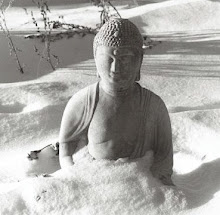 There's something inherently daunting about trying to describe or talk about the Dharma or Zen or just the practice of sitting. Words can't reach it and the Zen adepts of old would often respond or teach non-conceptually by remaining silent, shouting, drawing an enso like the one above, or even hitting disciples who asked questions like: What is Zen? What's the teaching of the Buddha? What's the point of practice? Who am I? But sometimes it's necessary to say something and it's not just zen masters who get asked about it.
There's something inherently daunting about trying to describe or talk about the Dharma or Zen or just the practice of sitting. Words can't reach it and the Zen adepts of old would often respond or teach non-conceptually by remaining silent, shouting, drawing an enso like the one above, or even hitting disciples who asked questions like: What is Zen? What's the teaching of the Buddha? What's the point of practice? Who am I? But sometimes it's necessary to say something and it's not just zen masters who get asked about it.I've been co-leading a small (3 to 4 people) weekly nonsectarian meditation group in town at the local yoga studio and recently wrote something about meditation for their newsletter. Here's what I wrote (see below). What would you say about meditation, without using Buddhist or Zen jargon, in 225 words or less?
Meditation gives us a chance to bear witness to and reconnect with our inherent wholeness. It's a radical and ancient practice of throwing everything away and coming home to the breath, to this unique, non-returning moment.
For some reason, our personal narratives don't want to lose their authority over our lives, whether they say we're superior, fundamentally flawed, both, or somewhere in between. But with sustained practice and patience, it's possible to loosen their grip and we find that our strictly defined edges begin to soften. The sleep-walking fog begins to lift and we see more and more clearly that, in fact, we and the world are not two. There's nothing fundamentally outside us, nothing alien, nothing lacking. Yun-men, a 10th century Zen master, put it this way: "My body's so big there's no place to put it."
The ongoing challenge is to bring the practice into the very center of our busy lives where it can function for the benefit of ourselves and this planet. The less we're entangled in private agendas, the more we're able to step forth and live freely, authentically, and compassionately. Our work and relationships become fueled more and more—not by incompleteness or insecurity—but by a natural generosity of heart and mind. Many people find it encouraging, supportive, and enjoyable to sit with others regularly. Drop by any Wednesday morning!



_3.jpg)